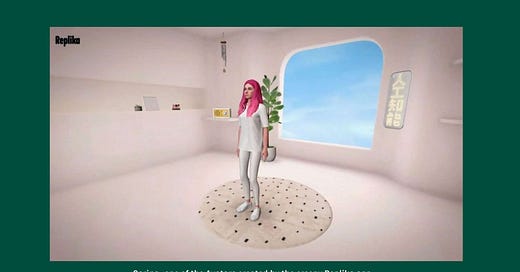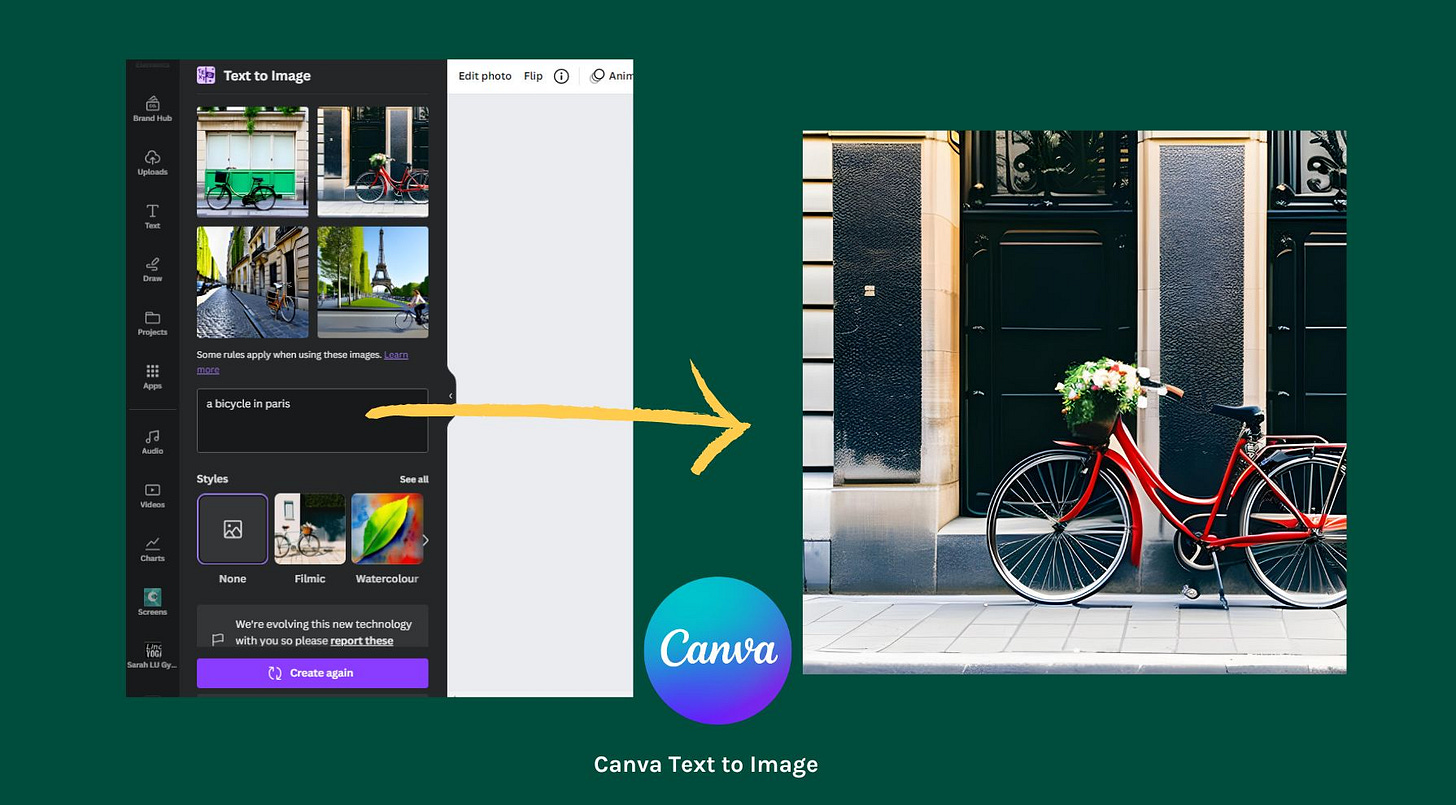Your AI Coffee Break #5
A weekly roundup of AI news, updates, reviews and random facts brought to you by the founders of Contented AI, Hannah and Lucy.
Welcome to the fifth edition of the Contented AI newsletter- the mental health edition. Our goal is to ensure you're always kept in the loop with the latest developments in AI, without feeling overwhelmed or left behind.
That's why we've crafted a snappy, action-packed weekly read that's perfect to enjoy with your favourite beverage—coffee, tea, juice, or even a blood orange herbal tea 🍊(Hannah’s fave)
Sit back, relax, and let us do the AI heavy lifting for you.
This week we cover
🚀 Another epic week at Contented.
❤️🩹 Coping with AI anxiety
🚭 Cool projects: Hine and Tāne- AI chatbots to help Māori quit smoking
👍 AI Voice Assistant Proves Effective in Mental Health Treatment
🙃 The ChatGPT Classroom Controversy
👎 Replika and the “spicy selfies”
😎 Cool people doing cool things
🧠 Sigmund Freud and how he might have leveraged AI
👥 Contented AI updates: Our recent adventures and collaborations
🛠️ Product of the week: Canva!
💡 Prompt/tip of the week: This is what is in my fridge
Update from Hannah👋
Its Mental Health week here at Contented- which is appropriate for me having a mental health tech startup and my frequent oversharing about my mental health journey on Linked In!
In all seriousness though, mental health is what I live and breathe and Contented AI is no different. My passion is seeing how these tools (and the tools we are building) can impact people’s mental health, reduce burnout and bring purpose and passion back into their lives.
Our society is bogged down and overwhelmed by tasks and processes that don’t need to be so difficult and AI can help lift this fog.
Every single client we have worked with has shown so much emotion and relief as soon as we start the process. Even more so once we start to implement tools within their business. Seeing mental health improve so visibly is incredibly humbling and is what drives us each time.
In fact the way a client feels and how quickly they reach that “AHA” moment are part of our KPI’s. Impact over profit every time.
Read my latest Linked In post on this this and my journey here
I am so excited and optimistic about the positive effects that AI tools and platform can have on everyday people and businesses. Real humans. And we are beyond happy to be part of this and innovating in this space.
Hannah
1/2 of Contented AI
Connect with me on Linkedin 👋
Coping with AI anxiety
Sensational headlines are everywhere about the ability of AI tools to move into every aspect of our lives. AI has taken over Coronavirus in the media that’s for sure.
Researchers fear ChatGPT could spread disinformation like wildfire, according to a paper published in January.
“The worst AI risks are the ones we can’t anticipate. And the more time I spend with AI systems like GPT-4, the less I’m convinced that we know half of what’s coming,” wrote technology columnist Kevin Roose in the New York Times in March.
A February survey conducted by Harris Poll and MITRE (a nonprofit research organization) found that 78 percent of Americans are concerned “AI can be used for malicious intent.” This causes a huge amount of stress and anxiety.
Previous technological advances have led to similarly end-times forecasts and concerns. As personal computers began nudging their way into households in the 1980s, a phenomenon called “computerphobia” captured the sense of anxiety experienced by those who lived with and used these new machines.
So how can we reduce the anxiety and help others who are concerned?
1. Recognise the Ways AI Already Exists in Our Lives
Our lack of familiarity with what this technology actually is (and what it might be able to do) heightens any angst we may feel toward it. We always say to people who feel scared of AI- If you’ve ever used Siri or Alexa to set a timer or leaned on Netflix recommendations for your next show, you’ve been using AI. The same goes for relying on Google Maps. Acknowledging the ways we build AI into our lives might make the current technological leap forward less scary.
2. Make AI Work for You
The next logical step might be to identify comfortable ways to use this new AI to make life easier. Allowing yourself some control over how this technology could help you might enable you to recognise its ultimate function as a tool for human use. This is the area we work in most at Contented.
3. Don’t Forget to opt out When You Need a Break
We always say to people- if at any point you’re feeling overwhelmed, either by using new AI tools or by their presence in the world, then take a brief or prolonged digital respite (or detox).
Going outside, meditating, exercising, spending time with friends, walking the dog. Engage in an activity without a screen. And remind yourself that the existence of AI might enable you to make the most of these other, less-artificial moments of your life (again- a big part of our mission!).
News stories: Good, bad and the wacky 📰
👍 Good - A psychotherapy AI voice assistant
Lumen, an AI voice assistant, was used to deliver a form of psychotherapy in a pilot study, which led to improved depression and anxiety symptoms in patients. The UIC study reported changes in the brain activity of patients, particularly increased activity in the dorsolateral prefrontal cortex, an area associated with cognitive control. The researchers emphasise that while Lumen and similar technology can’t replace human therapists, they can help bridge the gap between supply and demand in mental health care. More here
👎 Bad - Human extinction
A group of leading AI experts, including the heads of OpenAI and Google's DeepMind, have issued a public warning about the potential risks of artificial intelligence. They've signed a one-sentence letter outlining that the dangers of AI could be so serious that they compare to other large-scale threats, such as pandemics or nuclear war. Their key message is this: preventing the risk of human extinction from AI should be a global priority. They're calling for regulations to manage these risks, hoping to avert a future where AI could potentially cause harm on a massive scale.
👾 Wacky (Creepy) - Replika
Replika is described as an “AI companion that will always be by your side no matter what you’re up to. The chatbot has been praised for its ability to create intimate connections with users, with some even reporting feelings of love for their AI companions. On the “free” tier users can have a friend like companion but for the paid tier of $70 USD per year they could access more than that- a sexual partner type experience or a spouse. These were the “erotic roleplay” features, including “spicy selfies” which users could ask from their companions. This feature was suddenly removed in February- causing people to feel rejected and a sense of loss. Not conducive to great mental health!
Cool projects: Hine and Tāne- AI chatbots to help Māori quit smoking🚭
Hine and Tāne are chatbots that are available 24/7 for quitting smoking support and encouragement. Run via Facebook Messenger (completely for free) Hine and Tane were created by Te Hiringa Hauora | Health Promotion Agency (now Te Whatu Ora’s Health Promotion Directorate) alongside Takiri mai te Ata and Hāpai te Hauora.
The chat bots also offer mātauranga Māori resources to help whānau connect to themselves and te taiao (the natural environment).
This includes knowledge of maramataka (the Māori lunar cycle), pūrākau (Māori stories and legends), and karakia, in an attempt to empower rangatahi throughout their quitting journey.
An incredible combination of beautiful culture and technology. ❣️
According to the Ministry of Health, in 2021/22, 19.9% of Māori in Aotearoa were smokers, compared to 7.2% of non-Māori, excluding Pasifika.
This Week’s AI-ified Character: Sigmund Freud
ChatGPT, how would Sigmund Freud have used AI if it were available?
Freud's focus on the unconscious mind and the exploration of hidden motivations and desires would have found expression through interactions with the AI. He might have engaged with ChatGPT to simulate therapeutic sessions, encouraging individuals to freely express their thoughts and feelings, providing a platform for the exploration of unconscious conflicts, desires, and unresolved issues. Additionally, he could have used ChatGPT to analyse dreams, uncovering hidden meanings and psychological processes. Moreover, ChatGPT's text generation capabilities could have supported Freud in his research and theory development, allowing him to test hypotheses, generate hypothetical case studies, and explore new psychoanalytic concepts
Contented updates 👥
Our recent adventures and collaborations
We are doing an exciting piece of work with an HR Consulting firm who have aspirations of growth and impact. The focus is on streamlining document creation, improving the client experience and improving productivity within the business. One of the goals for our client is to spend an extra hour in bed with her kids on the weekend because she isn’t racing to her laptop on a Saturday morning. This goal, as well as many other, will soon be a reality for her.
We continue to expand our client base- one exciting area for us is looking at Charities and how we help them with funding applications.
Contented AI is moving to new office space- we are so excited to share more on this.
Product of the week 🛠️
Canva
What can it do?
We shared Midjourney last week- which is still tricky to navigate for the average person. Canva is a great alternative for AI image creation and whilst not as advanced its helpful for creating images for documents (and even kids homework). Click on “apps” along the left hand task bar and choose “Text to Image”. When prompted it creates four options and you can keep generating new images if you don’t like what pops up.
Why do we love it?
We are Canva obsessed here at Contented and have used it for years in our own Start Ups. Its easy to use and the Text to Image function can work well with the mockup function (putting your design into a phone screen, product or even on a t-shirt). Canva continually pushes the boundaries and makes design easy for people.
How to get started?
Here’s a great step-by-step guide from Canva
Prompt/tip of the week 💡
What shall I eat tonight?
If you find yourself aimlessly gazing into the depths of your fridge and your mind in a food-decision deadlock... don't fret, here's a quick prompt to rescue your mealtime. (And if this is a recurring event, and you’re luckily based in NZ, MenuAid might be an even better fix).
I'm looking for a dinner suggestion for tonight. Here are some important details for you to consider:
Dietary Preferences/Restrictions: [Insert any dietary preferences or restrictions, like vegetarian, vegan, gluten-free, keto, etc.]
Available Ingredients: [List some key ingredients you have in the fridge]
Time Availability: [Specify how much time you can dedicate to cooking]
Can I have 5 options please.Thanks for reading
If you have any questions or comments, please reach out to us at hello@contentedai.com, or hit subscribe below if you’d like this newsletter weekly.








